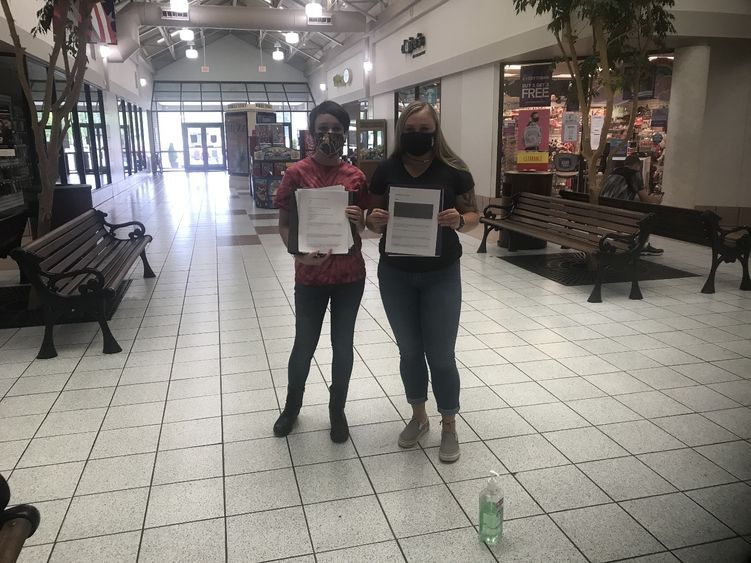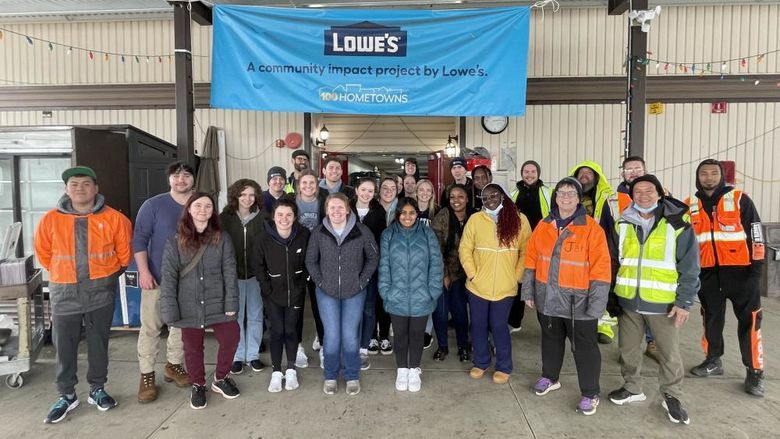
Students Tamara Seltzler, left, and Paige Pleta distributing surveys to members of the community at the DuBois Mall. They distributed surveys for the public to complete both locally, and in communities across the country.
Students in the Penn State DuBois Criminal Justice program are learning real-world lessons in maintaining good relations between law enforcement, the corrections system, and the community. As part of a project for the course “Criminal Justice and the Community” Lecturer of Criminal Justice Selena Price tasked students with conducting a survey to gather information on the perceptions of the criminal justice system and the police. They distributed surveys for the public to complete both locally, and in communities across the country. They sent out questionnaires electronically, and even knocked on doors, talking with local residents.
“The purpose of his exercise is to safely, following CDC and PSU guidelines, interact with the community and have a meaningful discussion about important topics of the criminal justice system,” Price explained. “It not only provides an inside look to how the community is perceiving the criminal justice system, but also allows the students to know what the community's concerns are about the police, courts, and corrections. The exercise provides the community with a voice to be heard.”
Students said they found the exercise educational on many levels, including the ways in which it revealed various attitudes held by individuals in the community. Student Tamara Selzler said that action can be taken by anyone who is interested in stewarding good relationships. She explained, “I surveyed people who are Native American, Caucasian, and African American from six different states on how they feel about the Police, court system, criminal justice system, police in the community, and the media. Everyone agrees the police play an important role in their community and believe that the police should be more open with members of the community and society to obtain better relationships in order to gain trust in the criminal justice system and to feel safe in their own neighborhoods."
Student Paige Pleta drilled deeply into the data she collected, noting differences in opinions among age demographics. She revealed, “I had a total of 27 surveys filled out from Pennsylvania and Ohio. My surveys consisted of questions concerning the police within the community. After getting all my surveys back and reading over them all, I decided to group them together by age. I got a variety of ages starting from 18 and ending with 57 years old. The teens, 20’s and 30’s were age groups where the answers were more likely to be the same. The other two age groups, 40’s and 50’s, also had answers similar to each other. The younger age groups talk about how police these days need more rigorous training and to help the public more than hurting them. As the 40’s and 50’s age groups say that the police are great and doing their job and do not need any more training or extra help with what they are doing. This shows that growing up in different times shows how you will view the police officers in America differently than others."
Price said the work on these projects contributes to an overarching goal of the Penn State DuBois Criminal Justice Program to train responsible future professionals. These lessons are building blocks that will lead to further collaboration and new learning opportunities.
“In a few months the students will need to create a safe community event with a criminal justice agency, such as police, courts, corrections, or victim services, that will foster a transparent relationship between the agency and the community,” Price said. This will bridge the gap between the us versus them mentality and to give back to the community. These events will help the students determine what would be the most impactful for both parties and, so far the results show the community wants to interact.”
Graduates of the Criminal Justice Program at Penn State DuBois will qualify for a broad spectrum of careers in areas including federal, state, and local law enforcement, corrections, probation and parole services, community crime prevention and treatment services, and private sector security. Additionally, there are opportunities in juvenile and drug rehabilitation counseling, recreation programs, forestry settings, and more. For more information visit https://dubois.psu.edu/crimj





